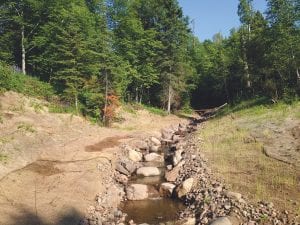After a decade of extensive efforts to clean up the Poplar River, it looks like success has been achieved.
The Minnesota Pollution Control Agency (MPCA) has recommended that the Minnesota Pollution Control Agency (MPCA) delist Poplar River.
The Poplar River Management Board (PRMB) was formed a decade ago in response to the MPCA listing of the lower reach of the Poplar River for not meeting water quality standards for turbidity.
The PRMB was created and funded by landowners adjacent to the lower portion of the river, and it operates in close collaboration with Cook County Soil and Water Conservation District (SWCD) and the Minnesota Pollution Control Agency (MPCA). Over the last decade, this partnership has raised and invested over $2,000,000 in projects to reduce erosion and sediment delivered to the river.
Also over this period, water quality data has been improving, and last year MPCA recommended the “delisting” of the river as it was then meeting state water quality standards.
“We are thrilled that the water quality has improved significantly and that the MPCA has recommended the river be de-listed,” said Tom Rider, PRMB board president.
“The PRMB board and its partners have invested huge amounts of time and money to get to this point. It has been a sustained effort for over a decade. We have a very strong partnership with Cook SWCD and MPCA, which has been part of the magic, and we also carried out projects in parallel with the scientific work so we could make progress as quickly as possible. If we had waited until the investigatory work was 100 percent completed before we started projects, it could have been another decade before we reached our goal,” added Rider.
MPCA’s delisting request has been submitted to EPA for final review and approval, which is expected shortly. The Poplar River is one of only two rivers statewide that has been delisted after not meeting turbidity standards.
The delisting approval will be a huge accomplishment for PRMB and its partners at Cook SWCD and MPCA, who have invested copious amounts of time and money over many years to reach this end.
Serving on the PRMB board with Rider are Scott Harrison, vice president, Jim Hall and John Klemme.
New grants
At the June PRMB meeting, an update was provided on projects and project status. By the end of this summer, a series of large projects will be completed using funds provided by the board of Soil and Water Resources Targeted Watershed Grant.
The total grant is $829,000 with a required landowner match by Lutsen Mountains of $207,250, bringing the total funds available of $1,036,250. This grant was awarded in 2015, a “flowpath analysis” was carried out to pinpoint remaining areas of concern, and in 2016 the “Stables Road” project was constructed to improve the stormwater system on the Stables Road on Moose Mountain. At that point, about half of the available funds had been spent.
The flow path analysis indicated that a large tributary running between Moose and Mystery mountains was a significant source of sediment. Engineering followed to develop a plan to address this, bidding followed that, and in early 2017 a contract was awarded for construction to the Nordic Group from Hermantown.
Work that began last fall has recently resumed and will be completed later this summer. A $156,000 grant from the Sustain Our Great Lakes Program, also helped to fund this project. This project is expected to reduce sediment delivery to the river by 140 tons/year.
The final project under this grant will address a large slump that developed last spring adjacent to the river. Barr Engineering conducted an extensive slope stability analysis that included drilling several wells and installing instrumentation in the wells to measure soil movement, water temperature, and water pressure.
Using this data, they were able to develop a model of the soil and water table in this area, and using that model engineered measures to slow the development and movement of these slumps. These slumps could potentially deliver a significant amount of sediment to the river, and could also cause considerable damage to private and public infrastructure.
The solution Barr developed has three components: re-vegetation; surface water diversion, and de-watering the slope. The last item is expected to be the most consequential and involves drilling multiple 170-foot wells, which will operate continuously to de-water the slope. The groundwater is pumped by these wells and is discharged to the Poplar River, which is where the water would have ended up otherwise, so this will not materially alter the river.
PRMB, Bar Engineering, Cook County SWDC have all worked closely with Minnesota Department of Health (MDH) and the Minnesota Department of Natural Resources (MNDNR) to address any concerns and obtain required permits and variances. Lutsen Mountains will operate the wells under an appropriation permit issued by the MDH.
All of the work is expected to be completed by fall 2018. This project is expected to reduce sediment delivered to the river by 50 to 9,000 tons/year, the more significant number representing a single catastrophic failure if that were to happen.
By the fall of 2018, it is expected that all grant and matching funds will be spent. It is anticipated that the landowner match will then be about $350,000, significantly more than the $207,250 required under the new grant.



Loading Comments